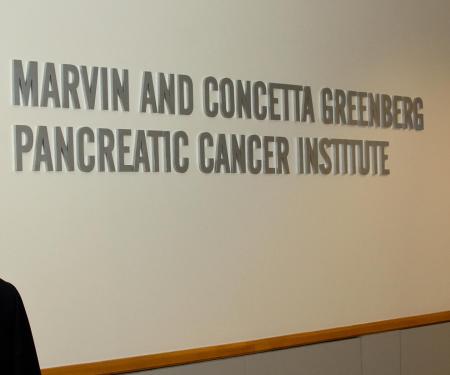PHILADELPHIA (November 1, 2017) – November is Pancreatic Cancer Awareness month, and Fox Chase Cancer Center remains steadfast in its commitment to pancreatic cancer research. The creation of The Marvin and Concetta Greenberg Pancreatic Cancer Institute at Fox Chase Cancer Center will significantly accelerate the pace of pancreatic cancer research, and its impact will be felt regionally and nationally.
The new Institute, a multi-million-dollar transformational gift by Philadelphia philanthropist Concetta “Chet” Greenberg, is co-chaired by Igor Astsaturov, MD, PhD, and Edna Cukierman, PhD, a pair of visionary researchers whose shared goal is to achieve breakthroughs in both early detection and treatment options.
“Pancreatic cancer is expected to become the second leading cause of cancer death by 2030, and the need for better detection and treatment strategies is urgent,” said Richard I. Fisher, MD, president and CEO of Fox Chase. Today, pancreatic cancer accounts for about 3% of all cancers in the U.S. and about 7% of all cancer deaths, according to the American Cancer Society (ACS). One’s average lifetime risk of the disease is about 1 in 65 (1.5%).
Pancreatic cancer begins in the tissues of the pancreas, an organ in the abdomen that lies horizontally behind the lower part of the stomach. The pancreas releases enzymes that aid digestion and hormones that help manage blood sugar. Pancreatic cancer is seldom detected in its early stages. “Because of the location of the pancreas deep inside the body, early tumors cannot be seen or felt in a routine physical exam,” explained Igor Astsaturov, MD, PhD, associate professor in the Department of Hematology/Oncology at Fox Chase. “People usually have no symptoms until the cancer has already spread to other organs.”
Risk Factors
While the exact causes of pancreatic cancer are unknown, researchers have identified several factors that can affect one’s chance of getting cancer of the pancreas.
- Tobacco Use
About 20% to 30% of pancreatic cancers are thought to be caused by cigarette smoking. One’s risk of pancreatic cancer is about twice as high among smokers compared to those who have never smoked. Cigar, pipe smoking and smokeless tobacco products also heighten risk. - Overweight and Obesity
Overweight and very overweight, or obese, individuals are more likely to develop pancreatic cancer. Even having extra weight around the waistline can raise risk. - Workplace Exposure to Certain Chemicals
Heavy exposure at work to certain chemicals used in the dry cleaning and metalworking industries may increase one’s risk of pancreatic cancer. - Age
About two-thirds of individuals with pancreatic cancer are at least 65 years old. Risk increases with age, with the average age at the time of diagnosis 71 years old. - Gender
Men are slightly more likely to develop pancreatic cancer than women. - Race/Ethnicity
African Americans are at a slightly higher risk than other races and ethnicities for developing pancreatic cancer. - Family History
Certain inherited DNA changes can lead to conditions running in some families that increase the risk of pancreatic cancer. Most often, however, DNA mutations of genes related to cancers of the pancreas are not inherited. “People with a family history of pancreatic cancer should talk with their doctor to determine if they should undergo testing early, when the disease may be more easily treated,” noted Dr. Astsaturov. - Diabetes
Pancreatic cancer is more common in people with diabetes, with the most risk found in those with type 2 diabetes. - Chronic Inflammation of the Pancreas (Pancreatitis)
Chronic pancreatitis is linked with a higher risk of pancreatic cancer (especially in smokers), but most people with pancreatitis never develop the disease. Those with an inherited (familial) form of pancreatitis have a high lifetime risk of pancreatic cancer. - Cirrhosis of the Liver
People with cirrhosis seem to have an increased risk of pancreatic cancer. - Stomach Problems
Infection of the stomach with the ulcer-causing bacteria Helicobacter pylori (H. pylori) may increase one’s risk of pancreatic cancer.
“Having a risk factor doesn’t mean you’ll definitely develop the disease, just as not having a risk factor doesn’t mean you won’t get cancer,” said Astsaturov. “The best way to reduce your risk of developing pancreatic cancer is by avoiding or changing those behaviors that are known risk factors for the disease.”
Sources:
https://www.cancer.org/cancer/pancreatic-cancer/causes-risks-prevention/risk-factors.html
https://www.cancer.org/cancer/pancreatic-cancer/about/key-statistics.html
http://www.mayoclinic.org/diseases-conditions/pancreatic-cancer/symptoms-causes/dxc-20268506
